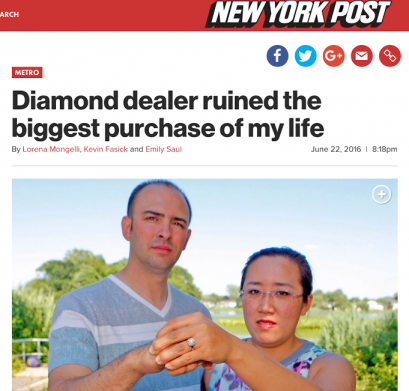The Dark Side of Diamonds and How to Avoid the Headache
July 5th, 2016
 By now, thousands of people have seen and read the sad story of a couple who thought they were getting an incredible deal. After making what should have been one of the happiest purchases of their life, the pair found out that they were sold a stone worth much less than they had paid and worth a mere fraction of what the "certified appraisal" claimed it to be worth. So how does the average consumer avoid this kind of situation? Though there is endless information available to the public about diamonds, it is impossible for even the most educated shopper to see with the difference between a real diamond and an enhanced or fake stone. At Gerald Peters, we want to make sure that NO ONE has to endure the nightmarish disappointment this couple faced.
By now, thousands of people have seen and read the sad story of a couple who thought they were getting an incredible deal. After making what should have been one of the happiest purchases of their life, the pair found out that they were sold a stone worth much less than they had paid and worth a mere fraction of what the "certified appraisal" claimed it to be worth. So how does the average consumer avoid this kind of situation? Though there is endless information available to the public about diamonds, it is impossible for even the most educated shopper to see with the difference between a real diamond and an enhanced or fake stone. At Gerald Peters, we want to make sure that NO ONE has to endure the nightmarish disappointment this couple faced.
First things first when shopping for a diamond, is to research your retailer. With resources such as Yelp, Google reviews, and Facebook reviews, its simple right off the bat to know if a store has done a good job making their customers happy or not. With ever-present social media, people can very easily vocalize their opinions and experiences, both good and bad. Additionally, it can be very helpful to search the name of your retailer against local news outlets. If incidents like the unfortunate one highlighted in the Post happened in your community, there's a good chance it's been written about somewhere.
With all things in life it's important to remember the saying "if it seems too good to be true, it probably is." Though pricing among different retailers varies, it is uncommon for somewhere to offer a deal that is so drastically different from its competitors. If you think that the deal you're getting might be one of these instances, shop around at other locations and ask for prices of similar size/quality diamond. If stores A, B, and C all price within one range and store D is drastically lower, there is almost certainly a reason for it.
Be sure to ASK QUESTIONS! Know what you're shopping for and ask to see as much paperwork as is available for the diamond. At Gerald Peters, we only sell GIA (Gemological Institute of America) Certified diamonds, which all adhere to a very specific set of standards. GIA is undeniably recognized throughout the jewelry industry as the best, most accurate, and unbiased grading of diamonds and gemstones. When you purchase a GIA certified diamond, you know that you are receiving the exact stone described in its corresponding certificate. You can confidently purchase a diamond knowing that it is not synthetic or enhanced, and the value of your diamond is unquestionable. GIA will not certify a diamond that has been artificially created, treated, or enhanced. Because all our diamonds are GIA certified, we offer a lifetime upgrade policy (see http://geraldpetersinc.com/Diamonds/ for more information) on all diamonds purchased with us.
Some people may ask why they may need a GIA certification if they have a "certified appraisal." There is a very simple explanation as to why an appraisal may not always guarantee you are getting the value you expect- appraisals are simply a matter of opinion and legally have no consequence for being "wrong." GIA grading is unbiased and accurate descriptions of the diamond you are purchasing, whereas appraisals are an opinion of perceived value based on certain characteristics. GIA is the foremost authority of diamond grading and is a non-profit educational organization and adheres to an unmatched set of standards when certifying diamonds, whereas an appraisal is simply an opinion.
If you are in the process of searching for a diamond, or even if you aren't and would like to learn more about diamonds and their properties, the knowledgeable staff of Gerald Peters is happy to answer any questions you may have. We take pride in helping create an educated consumer who can feel confident in their purchases and we strive to make sure our customers and friends never have to endure an experience that is less than excellent.


